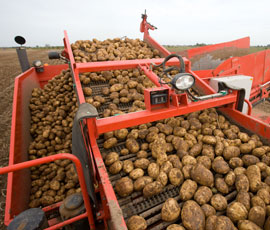Oils could reduce viruses in seed potatoes

Extreme blight pressure and the concern about a new blight strain this season has caused anxiety in the potato industry, but at a mid-season update at the Potatoes in Practice event, near Dundee, it’s not all doom and gloom
The application of oils has the potential to assist in the control of non-persistent viruses in potato seed crops.
Oils are currently used across continental Europe in conjunction with insecticides to assist in preventing the spread of non-persistent viruses, but crop inspections there take place post-harvest.
However, more work is required to establish the effects on seed crops here in the UK, due to in-season seed certification inspections, said Eric Anderson of Scottish Agronomy, who is leading a project looking at the practicalities of using oils in seed production.
“In seed stocks we are getting increased levels of non-persistent PVY, PVYn, and PVA viruses and there were questions as to why this was happening.
“Virus control programmes have traditionally centered around potato leaf roll virus, spread by the peach potato aphid, but there is now a realisation that other viruses and their vectors are just as important,” said Mr Anderson.
Despite the peach potato aphid being the most efficient virus vector, it is also easier to control, with its long stylet being able to reach deeper into the leaf and ingest systemic insecticides.
“It is a colonising species, which also makes them easier to deal with. However, here in Scotland it has been found that cereal aphids are the main vector,” explained Mr Anderson.
“Cereal aphids are more of a challenge, because they are transitory feeders, so are constantly moving through the crop. They also don’t have the ability to take up systemic insecticides.”
Oils have been shown to offer a reduction in the acquisition and transmission of non-persistent viruses by these vectors, creating a non-stick coating on the aphid stylet and preventing the virus being carried to neighbouring plants. However, questions still remain whether they can be applied to UK seed crops.
“We are looking at highly-refined mineral oil and vegetable oil and if they mask or simulate virus symptoms, it could compromise seed certification.
“We also need to establish what the interaction is between the oils and the blight fungicides being applied, as we don’t want to have a negative effect on blight control within the crop,” Mr Anderson said.
“We are in the second year of the trials, so it is a little too early to talk about positives and negatives, but it has the potential to give us another tool to keep virus levels under control.”
Read more from the Potatoes in Practice event
